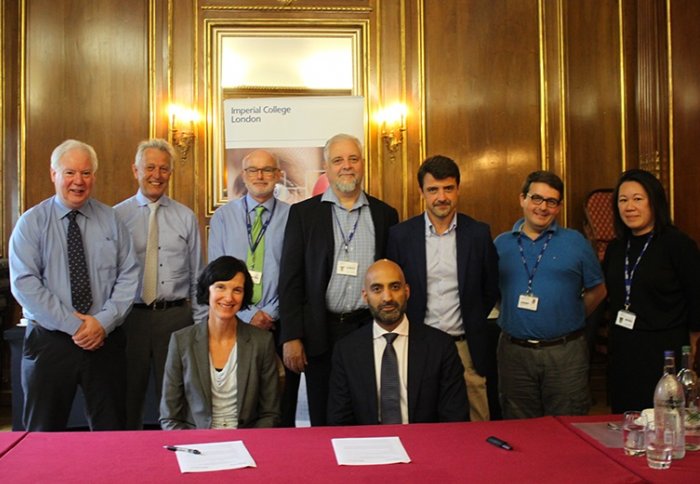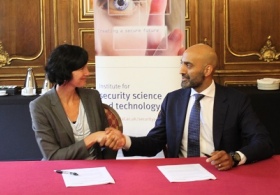Imperial College and Norwegian security researchers team up for secure societies

Members of ISST and FFI sign MoU
Tackling global security challenges in an increasingly interconnected world requires international collaboration.
The Institute for Security Science and Technology (ISST) has signed a Memorandum of Understanding with Forsvarets Forskningsinstitutt (FFI), the Norwegian Defence Research Establishment, to collaborate on the grand security challenges of now and the future.
The MoU was signed at Imperial College London on the 9th of August by Dr Deeph Chana, Deputy Director of the Institute for Security and Technology, and Dr Janet Martha Blatny, Director of Division Protection and Societal Security, FFI. It is an important, formal first step towards developing a vibrant portfolio of collaborative activities.
Dr Deeph Chana said “Security is an international challenge requiring international efforts. We’re delighted to be signing this MoU with FFI of Norway, and very much look forward to collaborating closely in the future. FFI’s relationship with the Norwegian government and defence sector complements our position in academia, as Imperial College’s security science hub.”
Dr Janet Martha Blatny said “We are facing new era of threats and changes in global security which has an impact on both civilian society and national defence. Understanding these changes, their consequences and the societal vulnerabilities they carry, obliges a knowledge based approach where science and technology are crucial to providing insight and solutions. This necessitates a civilian-military collaboration, where the Total Defence approach to national defence is of importance.”
Grand security challenges
As part of the MoU signing there was a full day of discussion on the grand security challenges faced by the two countries. Clear threads emerged, such as how climate change acts as a threat multiplier, and how the lack of understanding of the merging cyber and physical infrastructure is leading to security gaps across society.
Working together
One important theme discussed was the role of academia in providing thought leadership and a long-term narrative on security issues.
Deeph Chana said “Governments and industry often work to shorter timeframes driven by more immediate pressures, and you can’t blame them, but security 20 years from now will be defined by the policies, systems and technologies already being developed. As academics, we need to work in a triple helix with government and industry to provide the long-term vision and solutions for security.”
Under the MoU, ISST and FFI will collaborate on providing this thought leadership and will seek to influence policymakers internationally.
“At FFI we work tightly with industry and policymakers to serve as chief adviser on defence related science and technology to the Norwegian political and military leadership,” explained Dr Janet Martha Blatny. “Working with academia is an essential component of this as well. The complexity of the threat landscape is too great to be tackled only by government and industry.”
Interdisciplinary research
The Institute for Security Science and technology serves as a portal for the security-related research across Imperial College London. As such it is a natural partner for external organisations with an interest in cutting-edge security research.
During the day, FFI visited several labs to find out more. Highlights included a tour of the Centre for Blast Injury Studies led by Dr Bill Proud, and the bio-informed engineering work of Professor Holger Krapp’s laboratory, which is uncovering the incredibly efficient flight-control systems found in insects and applying them to drones.
Article text (excluding photos or graphics) © Imperial College London.
Photos and graphics subject to third party copyright used with permission or © Imperial College London.
Reporter
Max Swinscow-Hall
Institute for Security Science & Technology